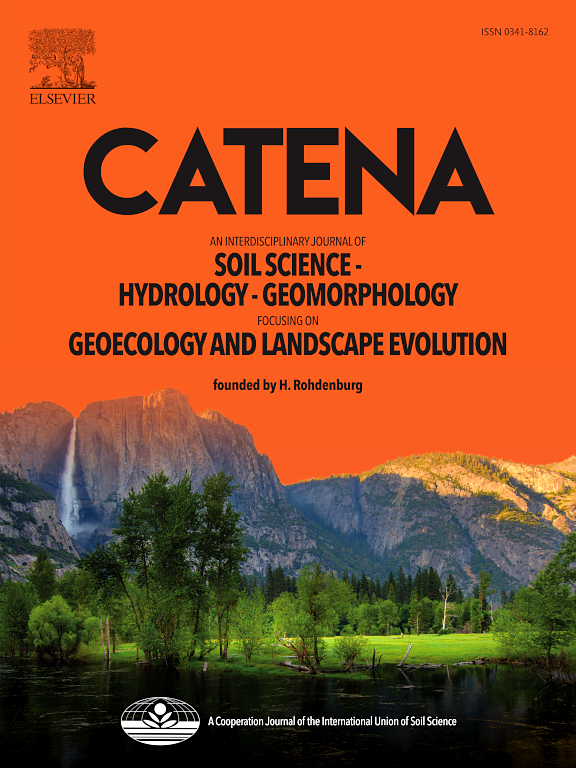Suspended sediment connectivity analysis: Snowmelt-driven dynamics in an alpine basin
IF 5.4
1区 农林科学
Q1 GEOSCIENCES, MULTIDISCIPLINARY
引用次数: 0
Abstract
Understanding snowmelt and its related suspended sediment transport in mountain streams is a crucial issue in the world of hydraulic and sediment research. Field-based approaches are still poorly used to investigate the response of mountain basins to different stages of snowmelt. To explain the suspended sediment dynamics of the Rio Cordon basin (Italy, Dolomites), the snowmelt in the year 2021 was analysed. First, a descriptive analysis of temporal trends of meteorological, hydrological, and sedimentological variables was carried out. Second, suspended sediment budgets of the main channel were quantified, considering the contribution of the tributaries at week- and event- scale, and supported by hysteresis analyses. Third, the role of sediment sources and snow cover was examined and integrated to comprehend variations in sediment supply from tributaries. Data were collected using a (i) multiparametric sonde installed at the outlet, (ii) water and sediment samples at significant points along the channel network, (iii) satellite images and sediment sources inventory. The whole snowmelt period 2021 featured 210.8 mm of precipitation and a mean temperature of 4.6°C. The total load of suspended sediment was 100 t. The main period of ablation was May, which showed contrasting suspended sediment dynamics in the four weeks. Sediment availability exceeded transport capacity in the initial two weeks, whereas transport capacity exceeded sediment availability in the subsequent two weeks. The main snowmelt event analysis mirrored the same trend: limited transport during the rising limb and the opposite during the falling limb. Such results were confirmed by the hysteresis analysis, proving to be an effective tool for detecting changes in suspended sediment connectivity. The variations of snow cover and the extent of sediment sources across the sub-basins influence the sediment supply. This study enhances our comprehension of snowmelt-driven hydrological and sedimentological dynamics, providing insights into the resilience of mountains to changing climate conditions.
悬浮沉积物连通性分析:高山盆地中由融雪驱动的动态变化
了解山区溪流中的融雪及其相关的悬浮泥沙输运是水力和泥沙研究领域的一个关键问题。以实地考察为基础的方法在研究山区盆地对不同融雪阶段的反应方面仍未得到充分利用。为了解释 Rio Cordon 流域(意大利,多洛米蒂山脉)的悬浮泥沙动态,我们对 2021 年的融雪情况进行了分析。首先,对气象、水文和沉积变量的时间趋势进行了描述性分析。其次,对主河道的悬浮泥沙预算进行了量化,考虑了支流在周和事件尺度上的贡献,并辅以滞后分析。第三,对泥沙来源和积雪覆盖的作用进行了研究和整合,以理解支流泥沙供应的变化。数据收集采用了以下方法:(i) 安装在出水口的多参数探头;(ii) 在河道网络的重要位置采集水样和泥沙样本;(iii) 卫星图像和泥沙来源清单。2021 年整个融雪期的降水量为 210.8 毫米,平均气温为 4.6°C。悬浮泥沙总负荷为 100 吨。主要消融期为 5 月,这四周的悬浮泥沙动态对比鲜明。最初两周的沉积物供应量超过了运输能力,而随后两周的运输能力则超过了沉积物供应量。对主要融雪事件的分析也反映了同样的趋势:在上升沿期间,运输量有限,而在下降沿期间则相反。这些结果得到了滞后分析的证实,证明滞后分析是检测悬浮泥沙连通性变化的有效工具。各子流域的积雪覆盖率和沉积物来源范围的变化影响着沉积物的供应。这项研究加深了我们对融雪驱动的水文和沉积动力学的理解,为我们深入了解山区在不断变化的气候条件下的恢复能力提供了依据。
本文章由计算机程序翻译,如有差异,请以英文原文为准。
求助全文
约1分钟内获得全文
求助全文
来源期刊

Catena
环境科学-地球科学综合
CiteScore
10.50
自引率
9.70%
发文量
816
审稿时长
54 days
期刊介绍:
Catena publishes papers describing original field and laboratory investigations and reviews on geoecology and landscape evolution with emphasis on interdisciplinary aspects of soil science, hydrology and geomorphology. It aims to disseminate new knowledge and foster better understanding of the physical environment, of evolutionary sequences that have resulted in past and current landscapes, and of the natural processes that are likely to determine the fate of our terrestrial environment.
Papers within any one of the above topics are welcome provided they are of sufficiently wide interest and relevance.
 求助内容:
求助内容: 应助结果提醒方式:
应助结果提醒方式:


